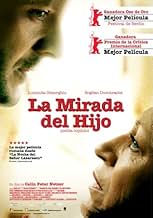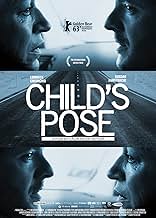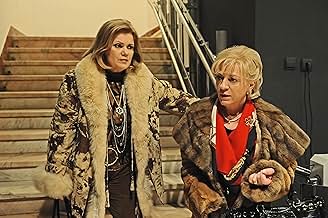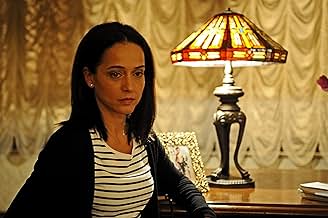Dopo la terribile notizia di un fatale incidente d'auto che ha coinvolto suo figlio, una madre disperata farà di tutto per liberare suo figlio.Dopo la terribile notizia di un fatale incidente d'auto che ha coinvolto suo figlio, una madre disperata farà di tutto per liberare suo figlio.Dopo la terribile notizia di un fatale incidente d'auto che ha coinvolto suo figlio, una madre disperata farà di tutto per liberare suo figlio.
- Regia
- Sceneggiatura
- Star
- Premi
- 13 vittorie e 8 candidature totali
- Leontina Vaduva, the Soprano
- (as Leontina Väduva)
Recensioni in evidenza
Reading bad reviews upfront, was afraid about getting bored from being too long, or dizzy from excessive use of hand held camera. Happy to report none of them apply. Instead, last frame was finding me quite surprised about how fast it was finished.
This film reminds me very much of "A separation" of Farhadi. They touched me in the same way, although the stories were different. That is because both stories are just recipients for emotions.
And in the end, this movie is full of emotions, human, universal, atemporal emotions. And that is what makes this film great.
What struck me from beginning to end was that all facts and backgrounds of the respective characters were presented at the right moment, something that helps greatly in understanding how the narrative flows. Many other films leave us too much to outguess, even some from experienced directors and script writers who ought to know better.
The mother figure is set out from the start as someone who always gets what she wants, either by pulling strings via someone she knows socially or professionally, or by bribing people when the need arises. The openings scenes show her birthday party, where we see many important people, setting out very clearly the social circles she normally frequents. In the police station we see her using her "network" by contacting higher echelons to smooth the process. And she promises a favor to one of the policemen whose house is threatened to be torn down, since it is deemed too close to the beach as a result of changed housing rules, and as an expert (being an architect) she knows how to bend the rules in such cases.
Of course, the best example of how she tries to adapt an unwelcome truth in her favor, is when she attempts to bribe the chief witness. An interesting negotiation process follows, making very clear to us that she is used to obtain the desired outcome much faster than is happening in this case. Contrary to popular belief, money is not always sufficient. Her obvious contempt for people not belonging to her "class", proves to be a stumbling block here. Will she ever learn that one can catch more flies with honey than with vinegar?? One of her obvious faults is exposed here.
But there is more along this line. A still more important shortcoming is her insensitivity for internal relationships within her family, firstly with her son who is a crucial factor in this story but not at all happy with her efforts to keep him out of jail, and secondly with her husband who admits to have been the lenient partner until now but is not prepared to go on like this. It takes her plenty of time to start grasping what is happening here, proverbially as if her world is crumbling down under her hands. It is obvious that she means well, but trying to bend things her way seems a mere automatism, without even bothering to ask if someone wants her meddling.
A mere side effect of seeing this film is that I forgot everything I've ever read about Eastern European countries, like inefficient police force, lazy bureaucrats, retarded technology, etcetera. This film shows that all of this is not true. The police acts very competently, at least in the scenes we see in this film, and we have no clue that this is not standard operating procedure. Same applies to the doctor who was needed for the alcohol test, and the forensic expert who assesses the damage of the car in order to draw conclusions about the accident. Moreover, technology (gadgets) wise it looks not different from what we have here in Western Europe. In other words, sightseeing (more or less) this former communist country was an extra surprise for me.
Though reluctantly, a considerable part of the family travels to the house of the killed child to meet the parents. Their prime purpose was to offer that they pay for the funeral, but effectively turning out very different from the short, obligatory and cold visit they originally had in mind. Judge for yourself when seeing this important scene whether there is eventually a spark of human contact between the two families.
All in all, I have only positive things to say about this film. I cannot agree with any of the two negative user reviews on IMDb posted before. What else can I add, other than applauding the decision of the Berlinale jury and the high average score of 8.7 given by 145 IMDb users.
What sets Netzer's film apart from some of the other recent Romanian works of cinema is its sardonic humor which works best when it's aimed at the characters and not at some of the pervasive practices of society. I've personally always felt that personal stories, meaning character stories, always came in second to some grand piece of social commentary, usually on the communist background of the country, in most of the acclaimed Romanian cinema of the 21st century. Not to say that such commentary lacks relevance, but there's just more to modern life than its dark red heritage.
Of course, "Pozitia Copilului" is deeply rooted in antics which one could call symptomatic of Romania and as a means of characterization, the backdrop is justifiable. Occasionally though, when certain aspects come across a bit too hard pressed, they do a disservice to the otherwise excellent balance of a difficult story. This does in no way undermine the beautifully detailed portrait of the film's main character, a highly controlling, bossy, arrogant, mean-spirited mother whose faults go quite a way to being redeemed by the passionate dedication with which she tries to protect her son, who had killed a child in a car accident. The ambivalence is so finely portrayed by Luminita Gheorghiu that both the moments of involuntary humor and the moments of pure drama work just as well.
It's ironic that Mrs. Gheorghiu also played in "Moartea Domnului Lazarescu", a film I found to be close at heart with "Pozitia Copilului", in that it relies heavily on a complex central character and its critique is subtle, yet scathing. I'd go so far as to say that these kind of films, while still dominated by a type of post-modernist bleakness, can lead a shift of focus to the greater importance of characters as individuals in Romanian movies, not only as symbol stand-ins.
Cornelia Keneres, portrayed with masterful understatement and restraint by Luminita Gheorghiu, is a haughty, emotionally aloof woman who, nevertheless, just can't seem to cut the cords that bind her to her only child, Barbu (Bogdan Dumitrache). Barbu, of course, resents his mother's endless interference in his life, an interference that is only intensified when he tragically runs over and kills a 14-year-old boy who's crossing a freeway on which Barbu is driving recklessly. Because Barbu seems devoid of initiative in trying to make things right with both the legal system and the family of the victim, Cornelia launches into full Mama Bear mode, lavishing large sums of money in her wake as she attempts to clean up the life-shattering mess her son has made for himself and others. Is Cornelia now paying the consequences for treating her son as a child for so long? Is that why he now finds himself unable to step up to the plate and accept responsibility for his actions as a mature adult should?
Filmed in a wholly realistic and naturalistic style, "Child's Pose" is about as far from melodrama as a movie about life-and-death issues could possibly be. There are no grand speeches, no emotional outbursts springing from the tragic events of the story. The movie makes us feel as if we are eavesdropping on these people as they go about the business of trying to make sense of an entirely senseless situation. As such, we get to witness first-hand the agony and grief, the bitterness and guilt, and the thirst for redemption that the various characters are going through.
As embodied by the extraordinary Gheorghiu, Cornelia becomes a fascinatingly complex character made up of any number of inconsistencies and contradictions. For instance, she's constantly deriding Barbu for not being a man, for making a mess of his life and not fulfilling the hopes she and his father had for him when he was younger. Yet, it is her very insistence on meddling, mothering him and stepping in to solve all his problems that is the key factor in making him this way. And is she truly moved by the concerns of the grieving parties or is she motivated more by the fate of her own son and the guilt she might be feeling for the way she raised him?
Flawlessly written and directed by Cailin Peter Netzer (with Razvan Radulescu as co-writer), the movie ends on a powerful note, one that hints at the barest possibility for reconciliation and redemption for the individuals involved. It's a largely wordless moment, heartbreakingly silent and obliquely shot, and it is a moment that will linger long in the memory of anyone who sees it.
Lo sapevi?
- QuizOfficial submission of Romania for the 'Best Foreign Language Film' category of the 86th Academy Awards in 2014.
- Citazioni
Cornelia Keneres: What did I do wrong?
Barbu: Never mind now. I'm putting this on the table. You can say yes or no. You either let me call you when I feel like it, or it's nothing. And a suggestion. If it's hard, find a substitute. A dog, a lover, a hobby. People your age visit the Pyramids.
Cornelia Keneres: Other people my age have a normal relationship with their child. Parents find their fulfillment in their children. Everything they failed to accomplish, they achieve through their children.
Barbu: So we're agreed.
I più visti
- How long is Child's Pose?Powered by Alexa
Dettagli
- Data di uscita
- Paese di origine
- Siti ufficiali
- Lingue
- Celebre anche come
- La postura del hijo
- Luoghi delle riprese
- Aziende produttrici
- Vedi altri crediti dell’azienda su IMDbPro
Botteghino
- Budget
- 850.000 € (previsto)
- Lordo Stati Uniti e Canada
- 97.170 USD
- Fine settimana di apertura Stati Uniti e Canada
- 12.955 USD
- 23 feb 2014
- Lordo in tutto il mondo
- 994.126 USD
- Tempo di esecuzione
- 1h 52min(112 min)
- Colore
- Mix di suoni
- Proporzioni
- 2.35 : 1




























